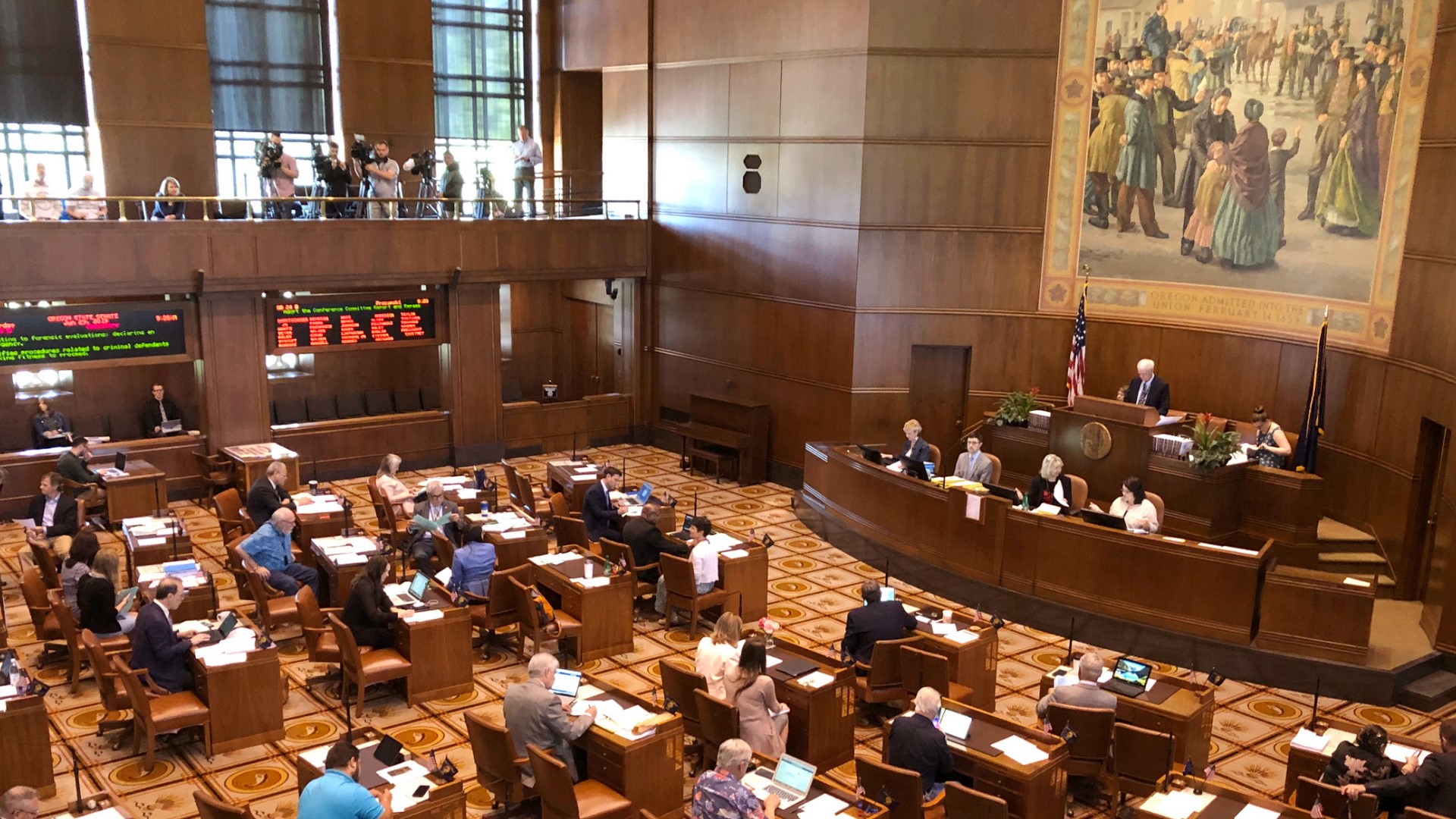Here are the new Oregon laws that went into effect Jan. 1
There are currently 20 pending laws that were passed in the 2022 legislative session and are scheduled to take effect in the new year.

Oregon’s new gun control and psilocybin laws have dominated headlines in recent weeks, both due to their hot-button subject matter and because their respective ballot initiatives, Measure 114 and Measure 109, both set dates in December 2022 as the deadline for implementation.
But the ballot measures are the exception; most new Oregon laws take a more conventional route to passage through the State Legislature, and they often take effect on Jan. 1 of the following year – or sometimes subsequent years.
There are currently 20 pending laws that were passed in the 2022 legislative session and are scheduled to take effect Sunday. They may not be as eye-catching as gun control or magic mushrooms, but they’ll still have big impacts on Oregon health care, education, labor law and more.
Here’s a rundown of what takes effect next week, along with their official summaries as listed on the Oregon State Legislature’s website:
Labor
Four of the upcoming laws are aimed at improving working conditions for Oregonians, starting with two pieces of legislation that update the state's workers' compensation laws. One of them broadens the scope of who can be claimed as a dependent, and the other requires employers to notify employees in writing when their disability benefits are going to end.
Two other labor-related bills made it through the legislature this year: One that puts new restrictions on the use of nondisclosure agreements and another that protects the right of employees at bakeries or tortilla manufacturers to refuse to work mandatory overtime on short notice.
House Bill 4086: Amends provisions of workers' compensation law related to beneficiaries.
House Bill 4138: Amends provisions of workers' compensation law related to authorization of temporary disability, claim closure and overpayments of compensation.
Senate Bill 1513: Prohibits employer from taking adverse employment action against employee employed in certain manufacturing establishments who refuses to work mandatory overtime shift unless employer has provided employee with at least five days' advance notice of overtime shift, including date and time of overtime shift.
Senate Bill 1586: Clarifies prohibitions regarding provisions that may not be included in agreements between employers and former, current or prospective employees.
Health Care
Four of the pending laws focus on health care issues, with an emphasis on either expanding health care coverage access or making existing coverage easier to use. One law adds additional cancers to the list of what counts as occupational diseases for firefighters, and another creates a dental coverage program for low-income Pacific Islanders legally residing in Oregon.
The third requires Oregon health plans to fully cover the cost of at-home nurse visits for newborn babies, and the fourth adds more schedule flexibility for workers who need to take their paid family and medical leave.
House Bill 4113: Adds to cancers covered by rebuttable presumption of occupational disease for eligible nonvolunteer firefighters.
Senate Bill 1515: Modifies definition of "benefit year" for purposes of paid family and medical leave insurance program.
Senate Bill 1538: Establishes a dental program to provide oral health coverage to low-income citizens of the island nations in the Compact of Free Association.
Senate Bill 1555: Specifies reimbursement that must be paid by insurers covering universal newborn nurse home visiting services.
Education
A few of the pending laws focus on education or other child-related matters. One bill sets a diversity target for Oregon Department of Education employees to match the diversity of the state’s students, and a second requires the department to survey student assessment tests to gather data to help improve testing.
A third law requires school board members or union members in high school districts to file verified statements of economic interest with the Oregon Government Ethics Commission, bringing them into line with what’s required of other elected officials. And a fourth law allows judges to appoint child support "referees" in some child support or parentage disputes.
House Bill 4031: Establishes state goal that percentage of diverse employees employed by Department of Education reflects percentage of diverse students in public schools.
House Bill 4114: Requires members of district school board for common school district or union high school district to file verified statement of economic interest with Oregon Government Ethics Commission.
House Bill 4121: Authorizes presiding judge of judicial district to appoint child support referee to process or hear certain child support or parentage matters.
House Bill 4124: Requires Department of Education to conduct survey related to academic assessments administered to students by school districts and to develop recommendations and best practices related to assessments.
Criminal statutes
A handful of new laws involve updates to Oregon legal statutes or enforcement procedures. The first is a bill that substantially raises the fines for unlicensed real estate activity, and another expands the scope of documentation that the state can collect related to sexual assault kits if the victim gives permission.
A third aims at speeding up the process of restitution for crime victims by making it easier for criminals to prioritize paying back victims before paying court fines, and a fourth tackles traffic enforcement problems by allowing the use of "traffic enforcement agents" other than police officers to review red light and photo radar camera images to issue citations.
House Bill 4075: Modifies procedures for requesting and ordering restitution in criminal cases.
House Bill 4103: Increases penalty for offenses related to engaging in professional real estate activity without holding active license.
House Bill 4105: Authorizes duly authorized traffic enforcement agents to review and issue citations based on photographs taken by photo red light cameras or photographs taken by photo radar cameras.
Senate Bill 1574: Includes specified documentation, when authorized by victim, in definition of "sexual assault forensic evidence kit" for purposes of statutes regulating collection, testing and retention of kits.
Miscellaneous
There are a few pieces of legislation that don’t fit solidly into one of the above categories, the most prominent of which is a bill that makes it easier for Oregonians to register to vote by allowing them to do it online using only a photo of their signature and the last four digits of their social security number.
Another big one updates Oregon’s statues to replace the term "alien" with "noncitizen." Two other oddballs are a bill to reduce the cost of one-day fishing licenses and a bill to put limits on the power of local governments to regulate property alarm systems.
House Bill 4027: Limits local government regulations on certain nonresidential alarm systems and battery-charged fences.
House Bill 4072: Relating to authorizations issued by the State Fish and Wildlife Commission.
House Bill 4133: Requires electronic voter registration system to allow qualified individual to register to vote if individual has Social Security number.
Senate Bill 1560: Updates statutory references to individual who is not citizen or national of United States to replace "alien" with "noncitizen." Directs state agencies to use "noncitizen" in rules and regulations to reference individual who is not citizen or national of United States and to update rules and regulations that use "alien" to use "noncitizen." Authorizes agencies to amend rule without prior notice or hearing for purpose of changing term or phrase in order to conform with change made by law.


